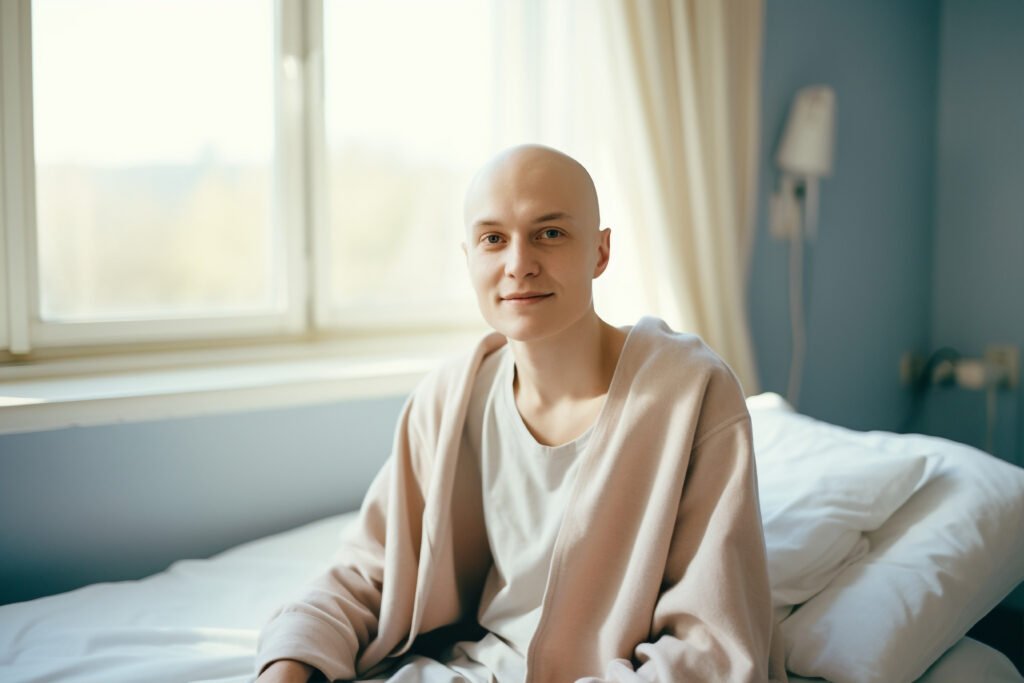Can male cancers affect a man’s fertility?
Testicular cancer
Testicular cancer is the most common cancer in men aged 15-35. It is diagnosed when the testicle is enlarged and has millimeter-sized perforated lesions. To be detected as early as possible, men should start self-examining their testicles from a young age, looking for abnormalities.
When cancer is diagnosed, treatment is necessary. Removal of the affected testicle is systematic: this is called orchiectomy. Depending on the analysis of the latter, the choice may be:
- to monitor the patient if they are at low risk (by imaging, clinical, and biological examinations)
- to continue treatment with chemotherapy/radiotherapy if he is at high risk.
The request for sperm freezing is systematic if the cancer progresses (and the treatments that this would entail). This cancer is generally limited to one testicle, fertility is preserved, and procreation can therefore occur without abnormalities. However, if chemotherapy or radiotherapy treatment is introduced, fertility may be temporarily (temporary toxicity) or indefinitely impaired. In this case, the collection and freezing of sperm before treatment for this cancer takes on its full importance.
Before any treatment, consider freezing your sperm (self-preservation)! This process is, unfortunately, often carried out in an emergency.
Prostate cancer
Prostate cancer is the most common cancer in men over the age of 50 (it is virtually non-existent before the age of 40). This cancer is part of a so-called “individualized” screening program: each year, men aged 50 and over are invited to undergo:
– a PSA measurement in the blood (a hormone reflecting the possible appearance of prostate cancer)
– a digital rectal examination to diagnose, by palpation of the prostate, a mass or an asymmetry of the prostate suggesting cancer.
If there is any doubt, an appointment with a urologist will be scheduled to take a few small samples of the prostate to look for cancer cells. Tests such as an MRI or CT scan may be ordered to look for other cancers related to prostate cancer (particularly in the bones, liver, or lungs). Once the diagnosis is confirmed, various types of treatment are available.
Complete removal of the prostate is the mainstay of treatment for this cancer. This removal almost certainly results in male infertility. For metastatic or recurrent cancers, hormone therapy—also called androgen blockade (castration)—is considered to block the cancer cells’ ability to multiply.
However, if castration is not enough, high-dose chemotherapy can be added. However, this is by no means the first-line treatment for this cancer!
Subsequently, monitoring must be lifelong, with:
- PSA dosage,
- images,
- clinical examination.
Removal of the prostate and surrounding seminal vesicles will prevent a man from ejaculating for the rest of his life. The erection will persist and still allow for sexual fulfillment. Androgen blockade, chemotherapy, or radiation therapy can also impact fertility.
Can male cancers affect a man’s sexuality?
Testicular cancer
In some cases, testicular cancer may require the removal of the affected testicle by the tumor. This operation is relatively well tolerated physically. However, the patient may experience some psychological after-effects from the loss of a virilizing organ. As a consequence, a loss of self-esteem can negatively impact sexual life (let’s not forget that psychological parameters play a key role in sexuality).
Is this the case for you? Your urologist/oncologist may offer you psychological support. Meeting with groups of testicular cancer patients can allow you to freely discuss your doubts and fears and move forward in the psychological journey of your pathology!
Prostate cancer
Treatment for prostate cancer (necessary to get rid of this pathology) can lead to problems in sexual life later:
- Either by direct damage to the ejaculatory ducts and seminal vesicles (which largely create sperm) during prostate surgery or radiotherapy
- Either by damage to hormonal pathways (in particular testosterone, a male hormone involved in the formation of sperm intrinsically and inhibited during treatment with hormone therapy).
Concretely, the anomalies potentially created by the treatment can generate an absence of ejaculation ( anejaculation ) for the rest of the patients’ lives. But let us remember: the age of patients with prostate cancer is almost exclusively over 50 years old (the desire for paternity is often satisfied)
In terms of consequences, we can also note a decrease or a total absence of erection post-treatment and a drop in libido (generally temporary, most often linked to hormone therapy). This can greatly handicap the patient, particularly on a sexual and psychological level. However, treatments exist! Your doctor will be able to tell you about them.
Chemotherapy/radiotherapy: What are the side effects on the body?
Although cancers are generally diseases of “older” men, some cancers can affect younger men. This is the case for certain types of lung cancer, testicular cancer, and even certain forms of colorectal cancer.
In this case, it is mainly the treatment itself that will affect the man’s fertility (especially chemotherapy or radiotherapy). The therapeutic molecule affects rapidly regenerating cells (such as cancer cells), but also thyroid or testicular cells (such as testosterone or sperm formation – spermatogenesis). The toxicity of chemotherapy treatments (powerful enough to eliminate cancer cells, remember) can cause abnormalities in sperm formation.
If you want to have children, sperm freezing should be considered. In vitro fertilization is also an option in some cases, particularly if chemotherapy, hormone therapy, or radiation therapy has not affected sperm production.

